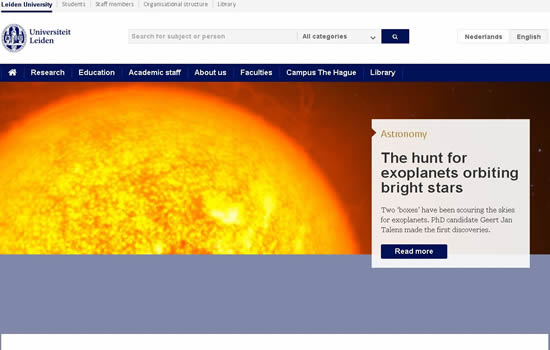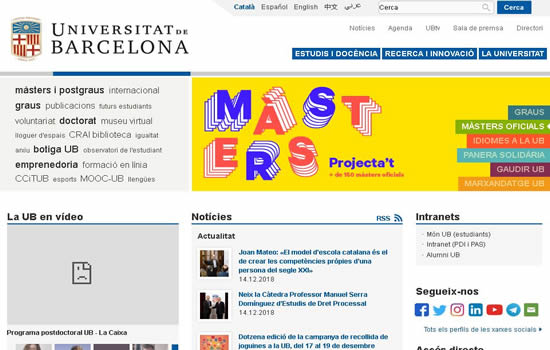选择热点
 荷兰莱顿大学
荷兰莱顿大学 西班牙巴塞罗那大学
西班牙巴塞罗那大学 巴西圣保罗大学 University of Sao Paulo, Brazil
巴西圣保罗大学 University of Sao Paulo, Brazil 台湾南华大学 University of South China in Taiwan
台湾南华大学 University of South China in Taiwan 科技大学 National University of Defense Technology
科技大学 National University of Defense Technology 南京大学 Nanjing University
南京大学 Nanjing University 上海复旦大学 Fudan University
上海复旦大学 Fudan University 泗水大学(Ubaya)
泗水大学(Ubaya) 印尼大学 universitas indonesia
印尼大学 universitas indonesia 越南某大学 Vietnam National University
越南某大学 Vietnam National University 菲律宾大学 University Of The Philippines
菲律宾大学 University Of The Philippines
英语中表示请求或许可的情态动词
发布时间:2025-01-06
来源:大学网站
英语中表示请求或许可的情态动词在疑问句中,主语是第一人称,表示请求别人允许的情态动词有can, could, may, might, 且从左至右越来越正式或客气,越来越不那么常用。
如:—I hear you’ve got a set of valuable Australian coin.
________ I have a look?
—Yes, certainly.
(北京春)A.
Do B.
May C.
Shall D.
Should【分析】答案选B。
may表示请求对方允许,即:“我可以做……吗?
”使用时还需注意以下4点:■表示允许或者不允许时,可用于任何人称,但不能用could, might。
如:1.
A left-luggage office is a place where bags ________ be left for a short time, especially at a railway station.
(全国卷)A.
should B.
canC.
must D.
will【分析】答案选B。
can表示“可以”。
should(应该), must(必须), will(愿意)均不符语境。
2.
—Will you stay for lunch?
—Sorry, ________.
My brother is coming to see me.
(全国卷)A.
I mustn’t B.
I can’t C.
I needn’t D.
I won’t【分析】答案选B。
can’t不可以。
家兄要来这一客观情况“不允许”我在这吃饭。
mustn’t 语气太强;needn’t(不必)和won’t(不愿)均不得体。
3.
—Could I borrow your dictionary?
—Yes, of course you ________.
(全国卷)A.
might B.
will C.
can D.
should【分析】答案选C。
允许别人做某事时,不可用could, might,可用can, may。
表示不允许别人做某事时,可以说No, you can’t / may not / mustn’t.
(不可以),还可以用I’m afraid not.
(恐怕不行),I’d rather you didn’t.
(我希望你不),Certainly not.
(当然不行)等来回答。
礼貌地拒绝对方的请求时,还可以伴以某种说明。
如I’m afraid you can’t because…■当迫切要求得到肯定答复时,往往用can’t和couldn’t来代替can和could。
但不用或很少用May I not…?
Mayn’t I…?
Might I not…?
如:—Mum, I’ve been studying English since 8 o’clock.
________ I go out and play with Tom for a while?
—No, I’m afraid not.
Besides it’s raining outside now.
(辽宁卷)A.
Can’t B.
Wouldn’tC.
May not D.
Won’t【分析】答案选A。
迫切要求得到肯定答复用Can’t I…?
另外,可用Won’t / Wouldn’t / Will / Would you…?
来询问对方是否愿意做某事,但却没有Won’t / Wouldn’t / Will / Would I…?
的说法。
■表示客气的请求的方式还有:Do you think I could / might use your phone?
或I wonder if I could / might use your phone?
等。
■主语是第二人称,可用Can / Could you…?
但不说May / Might you…?
如: How ________ you say that you really understand the whole story if you have covered only a part of the article?
(上海卷)A.
can B.
mustC.
need D.
may【分析】答案选A。
can在疑问句中,表示疑惑、怀疑,可译作“可以”。
答案B和C意义不通,答案D的may,不能用于may you…?
【英语中表示请求或许可的情态动词查看网站:[db:时间]】
如:—I hear you’ve got a set of valuable Australian coin.
________ I have a look?
—Yes, certainly.
(北京春)A.
Do B.
May C.
Shall D.
Should【分析】答案选B。
may表示请求对方允许,即:“我可以做……吗?
”使用时还需注意以下4点:■表示允许或者不允许时,可用于任何人称,但不能用could, might。
如:1.
A left-luggage office is a place where bags ________ be left for a short time, especially at a railway station.
(全国卷)A.
should B.
canC.
must D.
will【分析】答案选B。
can表示“可以”。
should(应该), must(必须), will(愿意)均不符语境。
2.
—Will you stay for lunch?
—Sorry, ________.
My brother is coming to see me.
(全国卷)A.
I mustn’t B.
I can’t C.
I needn’t D.
I won’t【分析】答案选B。
can’t不可以。
家兄要来这一客观情况“不允许”我在这吃饭。
mustn’t 语气太强;needn’t(不必)和won’t(不愿)均不得体。
3.
—Could I borrow your dictionary?
—Yes, of course you ________.
(全国卷)A.
might B.
will C.
can D.
should【分析】答案选C。
允许别人做某事时,不可用could, might,可用can, may。
表示不允许别人做某事时,可以说No, you can’t / may not / mustn’t.
(不可以),还可以用I’m afraid not.
(恐怕不行),I’d rather you didn’t.
(我希望你不),Certainly not.
(当然不行)等来回答。
礼貌地拒绝对方的请求时,还可以伴以某种说明。
如I’m afraid you can’t because…■当迫切要求得到肯定答复时,往往用can’t和couldn’t来代替can和could。
但不用或很少用May I not…?
Mayn’t I…?
Might I not…?
如:—Mum, I’ve been studying English since 8 o’clock.
________ I go out and play with Tom for a while?
—No, I’m afraid not.
Besides it’s raining outside now.
(辽宁卷)A.
Can’t B.
Wouldn’tC.
May not D.
Won’t【分析】答案选A。
迫切要求得到肯定答复用Can’t I…?
另外,可用Won’t / Wouldn’t / Will / Would you…?
来询问对方是否愿意做某事,但却没有Won’t / Wouldn’t / Will / Would I…?
的说法。
■表示客气的请求的方式还有:Do you think I could / might use your phone?
或I wonder if I could / might use your phone?
等。
■主语是第二人称,可用Can / Could you…?
但不说May / Might you…?
如: How ________ you say that you really understand the whole story if you have covered only a part of the article?
(上海卷)A.
can B.
mustC.
need D.
may【分析】答案选A。
can在疑问句中,表示疑惑、怀疑,可译作“可以”。
答案B和C意义不通,答案D的may,不能用于may you…?
【英语中表示请求或许可的情态动词查看网站:[db:时间]】
- 上一篇: be friends with还是be friend with
- 下一篇: worth用法要点归纳
相关阅读
目录列表
资讯列表
英语资讯


共0条评论
网友评论温馨提示:您的评论需要经过审核才能显示,请文明发言!